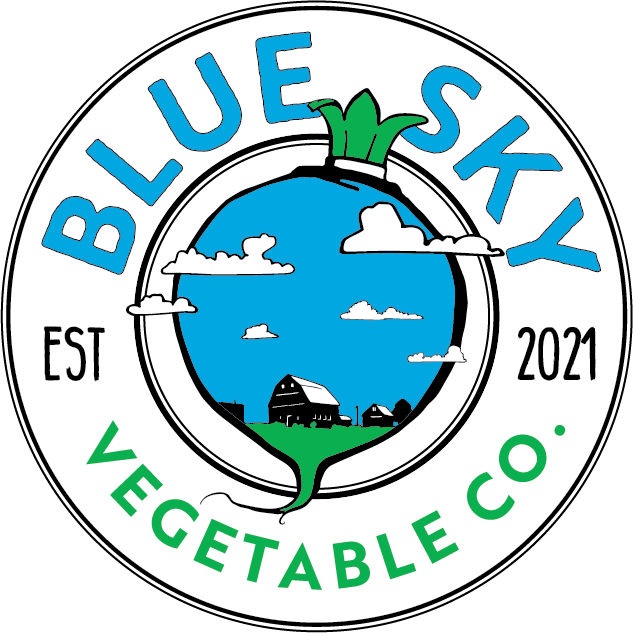Are your vegetables expensive?
Understanding the price of food is really complicated. Food prices are related to labor, inputs, subsidies, processing, delivery costs, and profit margins. Often times, local food is more expensive than commercially grown produce because our scale is smaller. In the same way that buying in bulk makes the unit price decrease, so does producing more food on a larger acreage like a commercial farm. But food found in grocery stores can also be priced artificially low because of a lack of justice in the food system - especially in regards to labor and fair wages. At Blue Sky Vegetable Co, we take our prices seriously. We believe nutritious food should be a right for everyone. We don’t want to price people out of buying our vegetables. So we carefully keep track of our costs and price our vegetables in order to cover our costs. But beyond price, we know our vegetables are going to be more tasty and nutritious than those in the grocery store because we put more care into each plant and we work hard to keep our soil healthy. The balance between prices and a good product is often tricky but we want to address the question of price upfront.
Inflation is on everyone’s minds and affecting everyone’s wallets. As we all make choices on how to spend our money, we want to assure that you we’re thinking about it for you too. Buying a Farm Share months before you actually see the vegetables can feel risky, but its a great way to budget and you can be assured that our produce is high quality and worth the price.
We set our prices before the seasons starts based on the prices of our inputs (seeds, potting soil, pest control, nutrients, labor, and packaging). And once those prices are set - they’re locked in! We’re not going to change the price of our Farm Share on you mid-season. Our goal is to provide you with the best produce and the best value through our Farm Share.
We frequently check grocery stores to see where our prices fall in comparison. And we want to be transparent so we thought we’d show you three examples of our vegetables compared to grocery store prices. We checked kale, peppers, and carrots at Hy-Vee, Walmart, and Aldi. We used the non-organic vegetable prices at all three stores. While we’re not certified organic, all of our inputs are organic - which would often mean a bump up in price in grocery stores.
Kale:
Our price: $3.25/bunch (8-10 medium leaves, or roughly a pound)
Hy-Vee: $3.99/16 oz
Aldi: $3.75/12 oz
Walmart: $3.48/16 oz
Carrots:
Our price: $2.50/pound
Hy-Vee: $1.79/2 pounds
Aldi: $2.09/2 pounds
Walmart: $3.88/5 pounds
Bell Peppers:
Our price: $1.25/pepper
Hy-Vee: $1.50/pepper
Aldi: $1.00/pepper
Walmart: $1.00/pepper
Based on our checking, our price is roughly equal to grocery stores on peppers, less than grocery stores on kale, and more than grocery stores on carrots. Our prices are going to be equal or better than grocery stores on most vegetables.
We included carrots purposefully because they are a great example of the concept of scale that I mentioned earlier. The majority of vegetables found in the grocery store (like kale or peppers) are harvested by hand (often by migrant workers). But carrots or potatoes found in grocery stores are machine harvested (check out this YouTube video to watch how grocery store carrots are harvested). Commercial carrot farmers can sell their carrots for a cheaper price because they have many acres of carrots but only need one person to harvest all of those acres. Because we harvest carrots by hand we go slower and might need more people to help than if we had a carrot combine harvester, so our labor cost and price needs to be higher to reflect those costs.
Our carrots are more expensive than those found at Aldi, but as we’ve heard from many of our members, they also taste a LOT better. Our carrots are sweet and flavorful. Which means our carrots took up nutrients from our soil and are also more nutritious (taste is a great judge of nutrition as far as fresh produce is concerned). Our produce is fresh - it goes from our field to your house almost always on the same day. Our produce is full of nutrients because our soil is full of nutrients (nutrients flow from soil to plants, healthy soil --> healthy plants). And it tastes how a vegetable should taste. And we want our vegetables to be accessible to everyone, even in the midst of inflation.
We may not win on price every single time, but we will always win on taste and nutrition.
